Here an attempt to predict what Tinubu will be telling the world when he speaks later today at the 78th United Nations General Assembly
Author: Admin
Africa’s Justifiable Coups
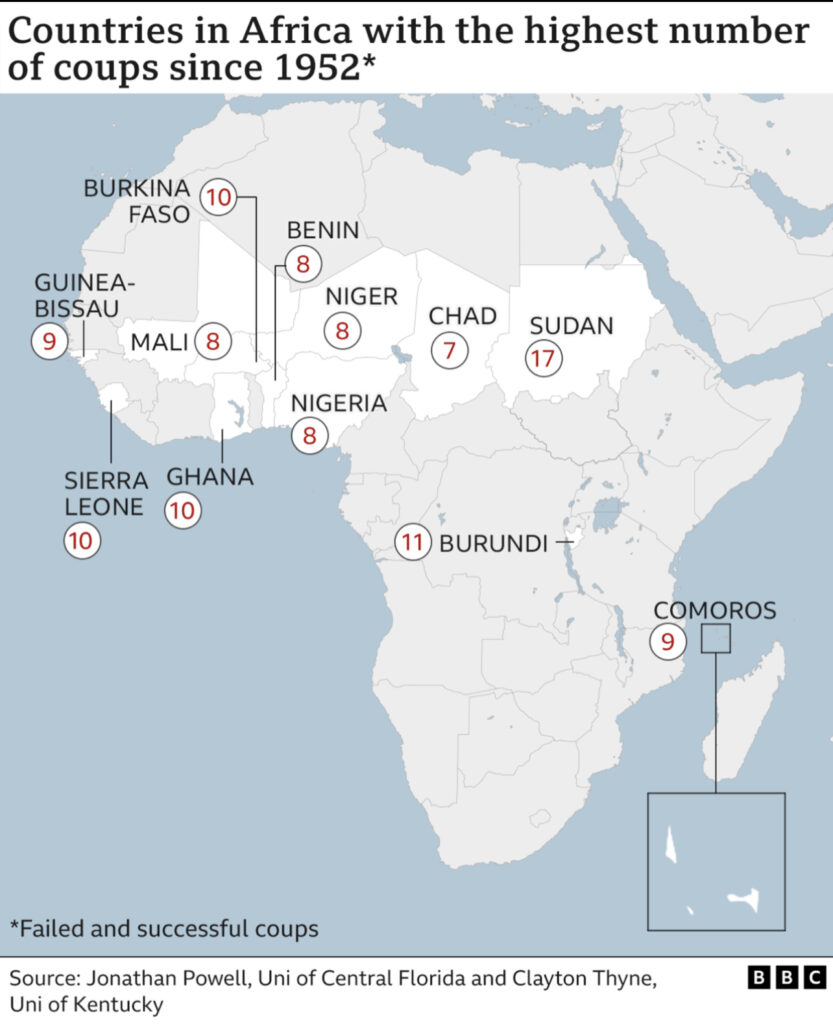
I was barely 6 months old when in January 1966, the first military seizure of power took place in my birth country Nigeria. Some 34 years thereafter, military rule held sway in Africa’s most populous nation. To a large extent, I could be rightly described not only as a ‘Warchild’ but also as a product of a military environment. To say the least, it is traumatising and perhaps psychologically deforming.
Outside textbook theories of the meaning of democracy, our generation of Nigerians only started learning in practical terms what true democracy is all about as from 1999. Some of us are adaptable but for very many of us, in our mid to late 30s, it was too late. Brut force, getting things the hard way, lack of inner peace, violence, aggression, and other vices had formed or deformed our psych. But not all of us!
While some of us believe these vices are normal, others consider them grossly abnormal. So we understand it when both young and old take to the streets embracing the military because they said they are the new messiahs that will bring them the good life, the prosperity that has eluded them for way too long.
When Bob Marley of blessed memory talked about chasing away the crazy baldheads out of the town, I now know that he was talking of no other than these African leaders that have determined that the children of Africa will not see or know peace.
The list is a mixed bag ranging from the often revered Gadaffi, who took over power by force, hung in there for 42 years and died in there rather than give power up. We can’t forget Omar Bongo either who stayed in for over four decades. Obiang is doing 44 years and counting while preparing his son, the Vice President to step in at any given moment. What about Museveni who has spent 38 years so far and won’t tolerate any opposition? We can’t loose sight of Paul Biya, can we? He’s been around as President for over 40 years and counting. But for a 4 year hiatus, Dennis Sassou Nguesso has held sway for 39 years. There are also the emerging oligarchs like Paul Kegame and Ali Bongo who have by one crooked means or the other have made the rulership of their fatherland a personal estate.
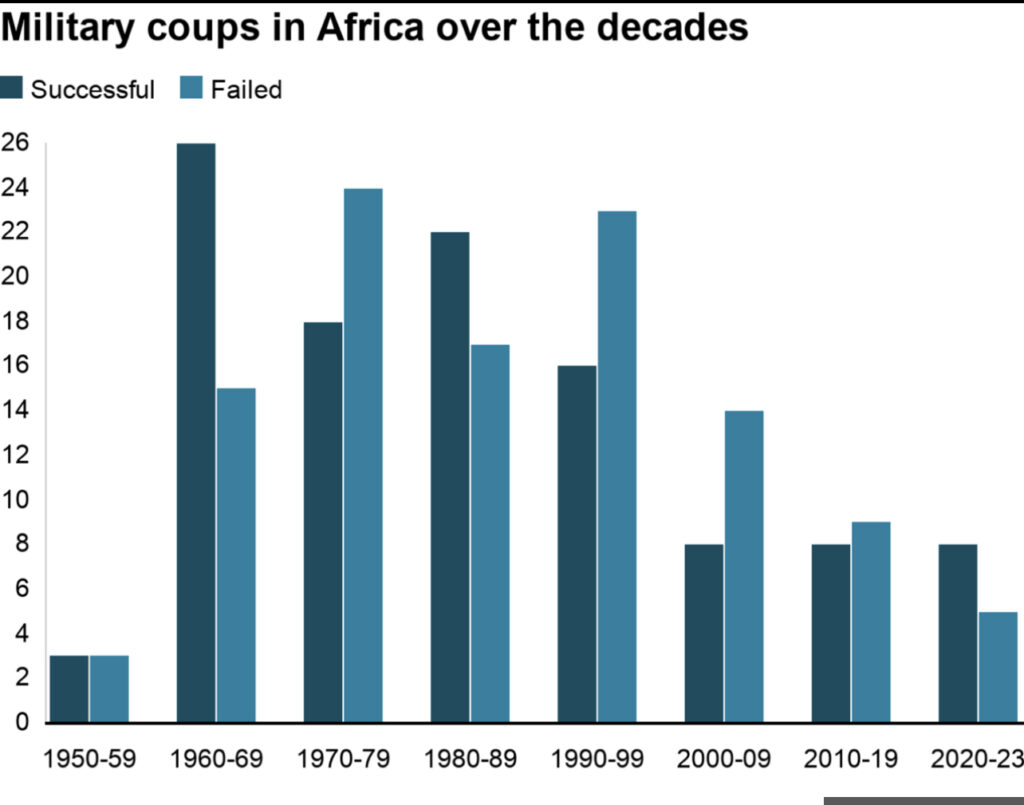
Do these abnormalities justify disruption of constitutional orders? No, not at all! While some of us maintain that coup is and remains an aberration, we understand the psychology of those who applaud the military boys for stepping in. The cliché that those who make peaceful coexistence difficult only makes violent dissent inevitable, comes handy here.
In all of these, some interesting queries around reshaping the world order are emerging. A couple of key emerging question are how well for Africa Western democracy is for the continent given that it was a forced system? Also how do you deal with neo-imperialism and its impact in retarding Africa’s growth? These are all germane issues worthy of interrogation but they should not be mixed up with the menace of power seizure with the barrels of the gun. These must be handled in isolation from the other even as closely related as they are.
To demonstrate the nature of coup as an aberration, there’s often a denial by ‘coupists’ that they committed a coup. An instance was in 2017 when in Zimbabwe, a military takeover brought Robert Mugabe’s 37-year rule to an end. Major General Sibusiso Moyo, who was one of the masterminds of the operation, appeared on television at the time, flatly denying it was a military takeover. In April 2021 after the death of the Chadian leader, Idriss Déby, the army installed his son as interim president, leading a transitional military council. His opponents called it a “dynastic coup” not a classic coup!
Two US researchers, Jonathan Powell and Clayton Thyne probably has the most plausible explanation for this denial when they concluded that coup leaders almost invariably deny their action was a coup in an effort to simply appear legitimate. One illegitimacy can not correct another or a hundred illegitimate actions.
My realist friend and comrade, Adetunji Omotola’s bluntness on this matter of coup in Africa is a truism that stirs us all in the face when he asserted that he sees all dictatorships collapsing this year with military take over of power. Irrespective of which side of the divide one is, there is perhaps a silent realisation that the soldiers might have naturally been assigned the role by Bob Marley of chasing the crazy baldheads out of town.
Reflections out of Father’s Day
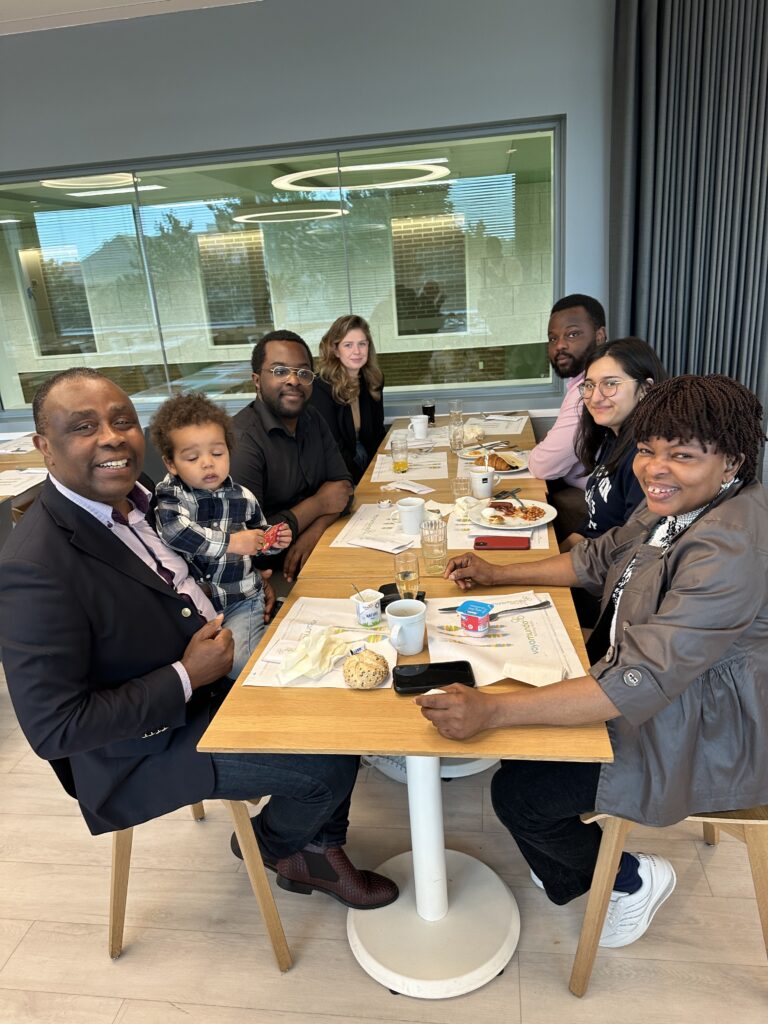
It took till late morning before we finally crawled out of bed after reviewing and sending a few enquiries over WhatsApp and receiving one or two calls.
One of the enquiries in particular was seeking permission to republish an interview I had back in February 2017 by Arukaino Umukoro of Sunday Punch Nigeria on Fatherhood:
Raising kids in Europe is challenging – Nweke.
I was flattered to read that this particular online media was keen to republish the interview as their lead article on the occasion of Father’s Day. I got even more flattered to learn that since its debut, the piece had been republished hundreds of times by different media outlets. Nice to know that people take active interest on the subject of fatherhood! And that my experience could be an inspiration to young fathers like those I fathered.
We shared the kitchen, Tonia and I, although at a point I was basically chased into a corner of the dining table while her preparation of moi-moi took all available spaces. The deal was for each one of us to make her / his favourite dish for Father’s Day.
I chose to make my Giant Meat Pie and Tonia, her Nigerian beans-cake, Moi-Moi. Yummy 😋
Just as I was putting on records that if the Giant Meat Pie turned out bad, it has to be because she dominated the kitchen, I felt a hand on my shoulder “Happy Father’s Day Daddy. How much longer will lunch take?” Meanwhile the oven had only just been pre-heated.
Everyone loved both delicacies or so my polite family said. The rest of the day was between my TV sofa, the fridge and the dinning room. Call it an ideal Father’s Day!
HAPPY FATHER’S DAY TO ALL YOU FATHERS OUT THERE AND SOME MOTHERS WHO FOR WHATEVER REASONS ARE ALSO PLAYING FATHER ROLES TOO!
http://punchng.com/raising-kids-europe-challenging-nweke/
Thinking aloud on ethics & political sagacity
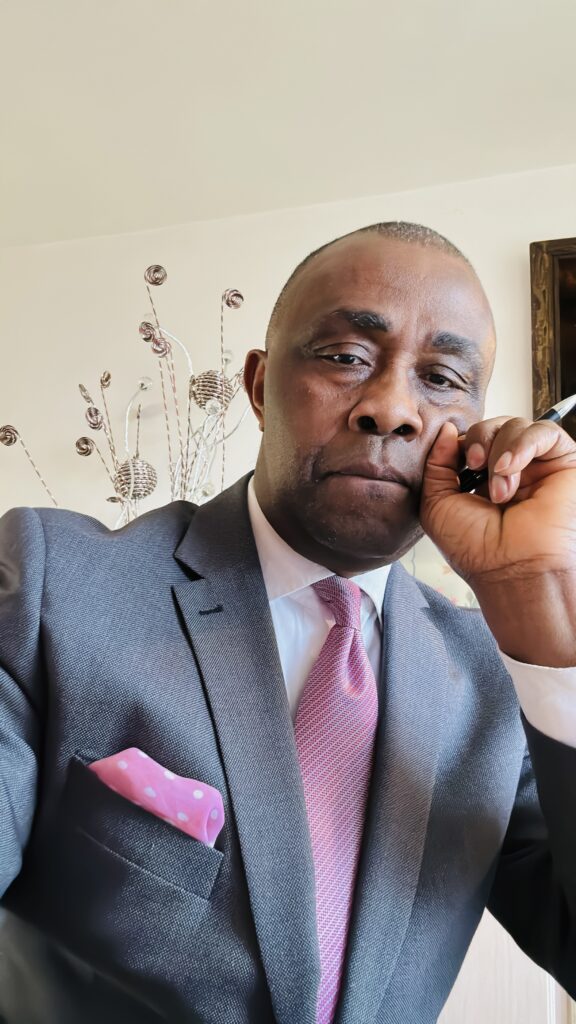
I neither called for a vote nor formally withheld my support for the motion. Thus in all political fairness, I have voted to continue an obnoxious system. As the more sagacious and experienced politician than I was, he ended his media submission with: “Collins is showing early signs of election fever. Please don’t take him seriously”
As political newcomer in my first term as Councillor for Social Affairs during the 2006 – 2012 legislative period, one of the issues that I took up the ruling socialist #leadership in council was on favouritism. More specifically, I was piqued to discover on assumption of duties that children of councillors and top civil servants were given priority in the selection for vacation #jobs in the Centre for Social Welfare. The favouritism went so far to the point that as Councillor, if you had no kids of schooling age, you could bring in grandkids, nephews, nieces or just anybody of your fancy. Just submit the name and that was it, no questions asked. As a matter of fact, the #vacancies were neither published anywhere nor publicly announced.
What I wondered aloud about was why would my kids be given priority over other kids just because their dad was Councillor? What happens then to competence? Does been my kids automatically make them more competent or better qualified than other kids, I queried the Council Chairman at the time.
I went further to suggest that if any prioritising was needed, we should consider children of clients on living wage and income support. These are exactly the #people whose networks are limited, if they have any at all. If we were serious about dismantling generational poverty, which was prevalent in our constituency at the time, that could be a place to start from. Council #leadership has sufficient #network to get their kids a vacation #job in just about anywhere in the private sector. If they are keen on their kids getting the public sector #experience, then they must compete for the job with others. Throw the student job market open, I persuaded.
At the end of my interpellation, I made what in my view at the time was a constructive proposal, but one which turned out, on the benefit of hindsight, to be politically naive. I do not wish to vote against the motion or to abruptly dislodge the existing order. But I implored Council to amend this order against the next #recruitment season a year away. We now have a whole year to plan and make a transition to a fair and equitable system.
When the #media later picked up the story and questioned the socialist Council Chairman, he denied that anything like that happened. In fact he concluded his denial by convincingly pointing to official Council records which didn’t register any objections to the motion. The motion was unanimously carried. Indeed mine were observations and recommendations. I neither called for a vote nor formally withheld my support for the motion. Thus in all political fairness, I have voted to continue an obnoxious system. As the more sagacious and experienced politician than I was, he ended his media submission with: “Collins is showing early signs of election fever. Please don’t take him seriously”
At the time, a truly independent media was scarce in my constituency. The Socialists had been in #power for such a long time and so highly networked that most journalists will rather look the other way than do a thorough investigative job. But not Johannes Hosten of the regional newspaper “De Zeewacht”. The young fearless reporter interviewed persons who in his words “were in a position to know the facts”. They all collaborated the denials of the Chair. He then went into public archives to dig up Council reports of the Sitting, which indeed confirmed my narrative. And he stated it as such, to the envy of the true progressives.
Fast forward to a decade later, when news broke about former UK Prime Minister, Boris Johnson, nominating his father for the 2023 Honours List for Knighthood. I had a moment to ponder over what I’d do. Would I nominate a family member for Honours List if I were in Johnson’s shoes? How similar or dissimilar is this to my vow never to favour family in public appointments? Recall that my point was not that my kids and those of other Councillors should not apply. Just that they should not be favoured based on our privileged positions. Indeed why should they be discriminated upon just because their parents are politically exposed?
In Boris Johnson’s shoes, I will nominate my father for Knighthood if I’m convinced that he’s qualified. I do not believe that it’s fair to discriminate against family because it’s family. Nominate but allow the system to run its full course without interference. There is still that little voice in me raising the question of #ethics. Is there an ethical question here or could this be that I have now attained the level of political sagacity that I lacked way back in the days. I kind of think that if political sagacity equates favouritism, then I’d rather remain political naivety. Not sure, just thinking aloud.
Winning pensions reform war but may loose the battle
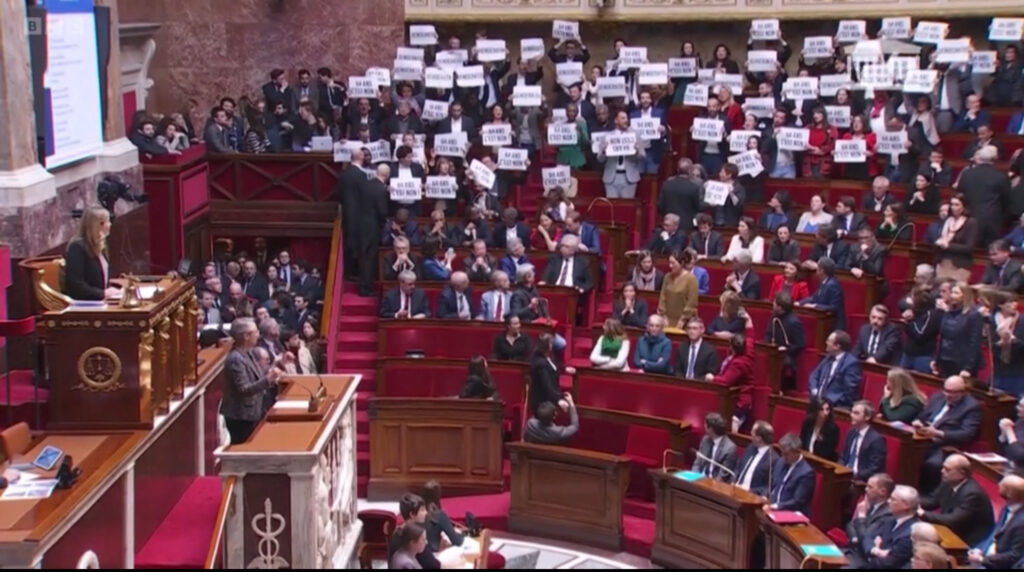
“Though Macron may ultimately be vindicated, people hardly forget legislations seen to be brutal, inhuman, and degrading. More so when they hear those on the other side of the divide tell them that there are alternatives to cutting too close to their bones.”
French President Emmanuel Macron had his Prime Minister, Elisabeth Borne trigger art. 49.3 of the French Constitution, to bypass the National Assembly in an attempt to push through unpopular pensions reform Bill without a vote.
French citizens have taken to the streets in protest. Parliamentarians are equally revolting. A call for a vote of No-Confidence is almost certain to fall anytime soon.
The dual questions here are: why did President Macron take this rather unconventional route, a serious political risk? How measured is this risk, will he survive a confidence vote?
Succinctly put, pensions reform was at the heart of Macron’s campaign for re-election. The Bill is a political exigency and Macron’s flagship legislation after re-election. He can’t be seen to have abandoned the cause and the course. Characteristically, he’s confident that the benefits of the reform will vindicate him in quick enough time for citizens to forgive him ‘his reform sins’. In other words, Mr President believes he can warm himself back to the hearts of French people.
On no-confidence vote, there is no combined, organised opposition against Macron, not on this pension reforms. Non-Bedfellows can hardly unite in the National Assembly to kick Macron out through a no-confidence vote.
President Macron’s undoing might turn out to be the abysmally low morale in France. The everyday French sees retirement as a bright spot in the future. And Macron has moved that bright spot further, thereby prolonging, at least their agony. Though Macron may ultimately be vindicated, people hardly forget legislations seen to be brutal, inhuman, and degrading. More so when the hear those on the other side of the divide tell them that there are alternatives to cutting too close to their bones.
This all looks like a war Macron will win but will loose the battle.
I joined Precious Amayo of TVC Latest News Update to dissect the French palaver… but only barely due to technical glitches. But here you have my more expansive perspectives Emmanuel Igah
Rescuing a Country from Political Hostage Takers
“The truth as it is known is that most parties in advanced countries engage in polling. APC and PDP are no exception here, as they have their own pollsters. They have consistently queried every poll, projecting Peter Obi as the winner while refusing to publish theirs” – Amb. Joe Keshi
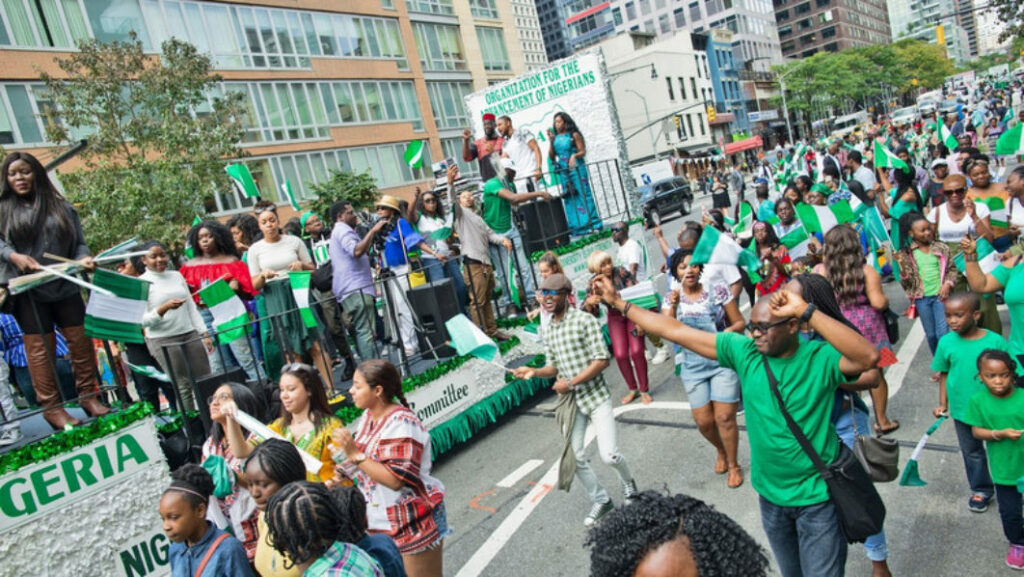
There are good reasons to be sceptical about opinion polls. However when polls after polls consistently put a particular candidate in the lead against his major challengers, and incrementally too, one should begin to pay closer attention.
We are talking of pollsters which include both entities leaning towards the Labour Party, the political platform of the projected winner of Nigeria’s forthcoming presidential election and independent international entities.
Some will tell you that the real poll to believe is the one on the 25th of February. For them you are not supposed to pay attention to any polls, they’d tell you. Some of them will readily cite the example of all polls pointing to the direction of Hilary Clinton as winner of the presidential election before last in the US. But Donald Trump emerged winner. While indeed Mrs Clinton won the popular votes as polls projected, that example may be right because Mr Trump took the electoral college and therefore won the Presidency.
Could this be the scenario that will play out in Nigeria. Could Peter Obi win the most votes across the nation yet he did not win 25 per cent of States of Nigeria? Some have asserted that the other two major contestants have actually commissioned there own polls but have suppressed the results because it does not favour them. They have then instructed their surrogates to play down Peter Obi’s lead with just any excuses , very much like what the Igbos of Nigeria refer to as the spittle with which the stench of a fart is endured.
The arguments against the Peter Obi lead and his electoral favourability status may have credibility if those on the other side could produce credible independent polls showing Obi as less favoured presidential candidate. Across the world, opponents playing down unfavourable polls is commonplace. Apart from sustaining the enthusiasm of supporters is known to be the general strategy here. In Nigeria, an additional reason is to allow space for electoral fraud by the major parties commonly known as rigging. Faith in the electoral system and process is abysmally low in Nigeria if it exists at all. Some conspiracy theories have indeed alluded the ongoing nationwide currency redesign crisis to a preconceived scuttling of the elections because the signs are not looking good for the powers that be.
Peter Obi’s predicted occupancy of Aso Rock Presidential Villa come May 2023 is becoming too difficult to ignore. That is if the election is allowed to hold in the first place.
Gone Home But Remains Audacious
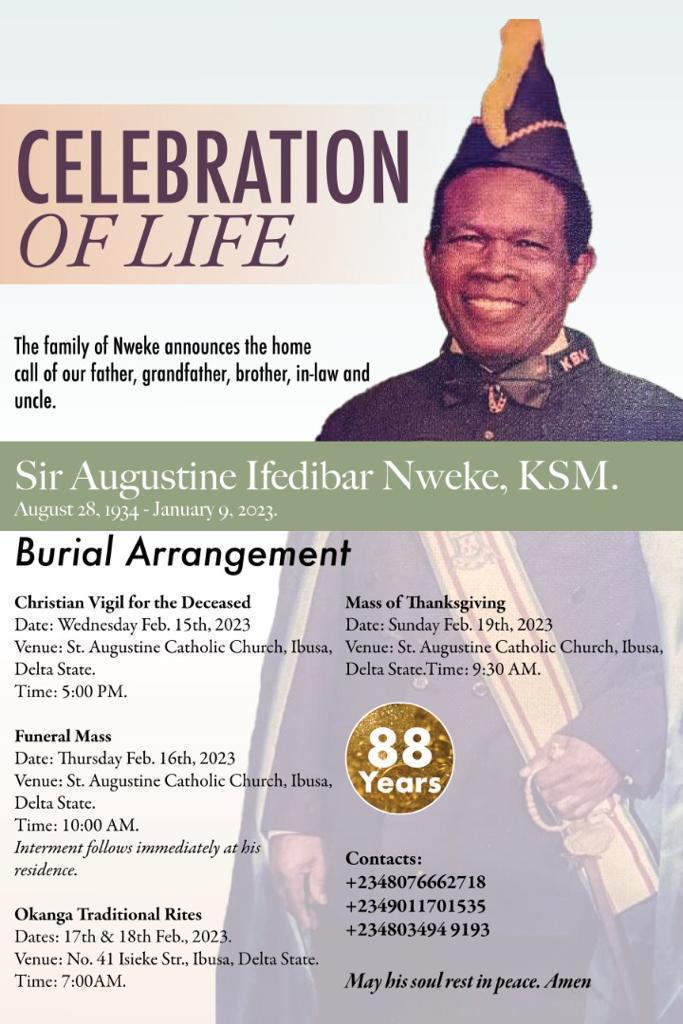
Many knew him as Papa. Few knew him, like I did, as uncle. Yet to everyone he is A I Nweke, the trademark sign-off for his artworks. At just under 70 years of age, unannounced, he had a major life threatening health challenge: a stroke! Typical of him, he immediately sought to know all there is to know about stroke and empowered himself to make an amazing initial recovery.
When I visited home in the summer of 2009, we sat down for a conversation. And there was nothing noticeable about his stroke attack. A great relief it was!
Some of his ways way back when I was a boy did not make sense to me. But they did years later when Europe became home to me. Our conversation somewhere around that summer of 2009 was an opportunity to try and understand where he was coming from now that his ways are making sense to me.
For want of space, I’d touch on just a few of those ways of his that I checked with him in our conversation. Why did he have bird sanctuaries at his residence in rural Obiaruku, Ukwuani Local Government Area of Delta State, at a time when people hunted birds for their dinner tables? Why was he such a proponent of naturally grown (organic) food at a time when fertilisers and other mass food production technics were popular, maybe even a hype? Where did his faith in young people derive from, to the point that whenever he spotted an artistic talent in a young person, he literally adopted the individual and groomed him or her in the art form of the youngster’s aptitude? It was a catalogue of why’s….
In the end, he fell into his characteristic audaciously hearty laughter. To cut long story short, his response to my queries was reminiscent of the manifestos of Green & Social Democratic Western ideologues. The only reasonable conclusion I could draw from those critical exchanges, the longest and most meaningful that I ever had with him in my entire 40+ years on earth at the time, was that the man was simply way ahead of his time. I left Igbuzo for Europe on that visit feeling that my fancy for social-ecological issues was probably a family microbe because his older brother, my father, wasn’t any less radical on those matters, even till today at 96.
I yarned to deepen the conversation… When I had the opportunity some years later, it was too late. Though he was aware of his environment, having recognised Tonia, my wife and I and hugged our Boys who were meeting their great uncle for the first time, he could not sustain a conversation for too long.
He mentioned that my wife was an alumnus of the Delta State University where he was a lecturer and that she had visited her a number of times with Valerie, his second daughter. He didn’t fail to remind her several times that she shares a name with his lovely first daughter… That characteristic sharp intellect was ever present. Life could be cruel and unfair. The fighter fought and would defy death a number of times…His light finally dimmed on 9 January 2023 at age 88. Not bad given that life expectancy in Nigeria is 53.
At the level of his profession as scholar and artist, by all standards, Sir Augustine Ifediba Nweke was an embodiment of persistence, patience, passions, adventure and discipline. These virtues reside in his success in painstakingly researching the founder of our hometown, Igbuzo and gifting his descendants, the only existing sculptural image of Prince Umejei. Same goes for the Goddess of Oboshi, where again he demonstrated uncommon scholarly acumen, engaging the Ohene of Igbuzo, to create for Igbuzo, their Goddess Oboshi.
How can such a man as Sir Augustine Ifediba Nweke, ever die? No, not when so much of his legacies remind us of who he is, letting him reside in our subconscious with a domineering presence. As we say adieu Papa, we are audaciously reminded that you led a life of purpose, at which end, you just can’t die.
Collins Nweke
Nephew
Thursday 16 February 2023
The Irony of a Continent and its Diaspora
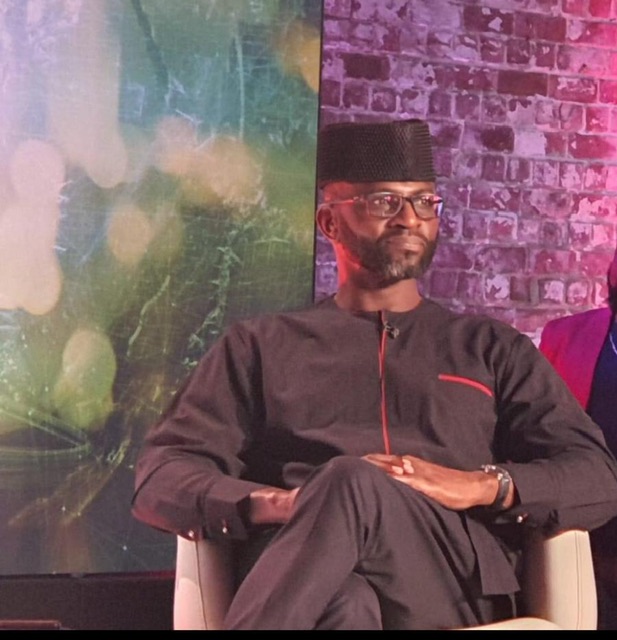
In this exposé, Nigerian-born African enthusiast, Adetunji Omotola adds his audacious voice to the cry for Africa to recognise the value that her sons and daughters bring to Africa’s growth table and purposefully mine it for the global good.
The millennium saw the emergence of Africans in diaspora as a force with which to be reckoned. Some diasporans serve in the highest levels of government and many returned to Africa,particularly in Kenya, Ghana and Nigeria. Dr Ngozi Okonjo-Iweala, the current Director General of the World Trade Organisation; Dr Akinwunmi Adesina, the current President of the African Development Bank; Wally Adeyemo, the current US Deputy Treasury Secretary, and the Nigerian Minister of Foreign Affairs, Godfrey Onyeama are some diasporans who have made it to cabinet level in Nigeria and beyond.
Nigeria leads sub-Saharan Africa in terms of diaspora remittances, with $23billion in 2019, followed by Ghana ($3billion), Kenya ($2.8billion) and South Sudan ($1.3billion). On the global remittances index Nigeria is in sixth place, with India in the lead ($79billion), China in second place ($67billion), Mexico third ($36billion), Philippines fourth ($34 billion) and Egypt fifth ($29billion). Despite these positive contributions by diaspora, there is a sense that that diasporansfeel extremely marginalized and unjustly treated. Nigerian Diasporans not having a vote is a grave injustice, when other African countries, such as South Africa, Kenya, Botswana,Rwanda and seventeen other African nations practice diaspora as a matter of course.
Nigerians in diaspora remittances still does not guarantee any inclusion into the Nigerian landscape. It also seems clear that,despite having a newly formed diaspora commission, there is no determination on embarking on a census on the numbers of Nigerians abroad. Research shows that the United States, UK, Italy, Germany and Canada have the largest numbers of Nigerians, followed by South Africa, France, Ireland, China and the Netherlands. These are the top ten countries with Nigerian populations. At the top is the USA (380,785), followed by UK (190,000), Germany (56,000), Italy (71,000), Canada (51,800),France (30,000), South Africa (30,000), Ireland (17,542), China (10,000) and the Netherlands (9,453). Great difficulty exists in determining the numbers in various African countries, due to a lack of data. According to Statistics South Africa in 2015, there were 10, 334 Nigerians who had temporary residence permits,25% of which had visitor’s visas and 355 had permanent residency permits.
Despite the success of Nigerians in foreign lands, the fact that there is still disconnectedness on many levels is painful and disheartening. There is no Nigerian national policy to absorb diasporans into the broader national landscape beyond settlements and investments. There ought to be a shift in the current haphazard methods in place for diaspora inclusion. It is a travesty of gigantic proportions that many Nigerians are ignored in a manner that creates deep concern and misery. There also exists a bias by those in authority towards Nigerians in the United States, Canada and Europe. The issue of not voting is one of the most notable examples of the failure to absorb Nigerians in diaspora into the political and economic development of the country. So many flimsy excuses are given by the members of the National Assembly and INEC regarding a lack of data and costs and also who will vote and which countries will be involved. This lack of political will is like a knee on the necks of Nigerians in diaspora, who observe voting by diasporans in Rwanda, South Africa, Botswana, Kenya and eighteen other African countries.
Nigerians in diaspora are the most educated migrants in the US. Most African doctors in South Africa are Nigerians, and there iseven a Nigerian Doctors Forum in that country. A Nigerian holds the world boxing heavyweight crown and there is the NBA most valuable player, Gianni’s Antetoukoumpo. Nigerian Ngozi Chimamanda-Adichie is a superstar and there is a slew of Hollywood actors, such as Chiwetel Ejiofor and more. There is Asa and John Boyega and Bayo Ogunlesi who owns Gatwick airport and was Trump’s adviser for some time. With all these observations it is clear that Nigerians in diaspora succeed across many formations and professions.
Nigerians in diaspora will provide Africa’s upward trajectory. What is missing at this stage is the ability of planners and African leaders work with various Nigerian diaspora groupings to access bodies like the African Union, the African Development Bank, the Pan African Parliament and regional bodies to build capacity and leverage the professionalism and skillsets of Nigerians in diaspora. The best kept secret that Nigeria and Africa by extension has in term of human capital is Nigerians in diaspora. Recently, Lt. Victor Agunbiade was given an award for his extraordinary accountability. Agunbiade received the Navy and Marine Corp Development medal for successfully managing $68 million. The amount represented 70% of its overseas disbursing volume. Agunbiade who was in charge of the money while he served as disbursing officer, comptroller department, Camp Lemonier in Djibouti (Horn of Africa) from October 2019 to July 2020, achieved 100% accountability among six rigorous inspections and independent audits with zero discrepancies.
Nigerians have become notable in the USA. Dr Bennet Omalu was the first person to discover and publish on chronic traumatic encephalopathy in American footballers. (Will Smith plays him in the 2015 film Concussion). In the legal space ImeIme A. Umana is the first black woman to be elected President of the Harvard Law Review in its 131 year history. Pearlana Igbokwe is the President of Universal Television and the first woman of African descent to head a major US studio. Dr Jacqueline Nwando Olayiwola is an Associate Professor at the University of California and the author of “Papaya Head” which speaks to first generation African Americans. Jacqueline’s siblings are Okey Onyejekwe, a medical doctor, Meka Don a lawyer turned rapper and Sylvia Onyejekwe, a lawyer. Jacqueline and her brother Okey frequently undertake two mission trips to Nigeria every year.
In the Netherlands there is circular migration between Nigerians in the Netherlands and the UK. Most are employees of Royal Dutch Shell and some work for ABN Amro, Nike, Celtel, IBM and CMG. There are about 500 Nigerians with Dutch passports. In Russia there are 2100 Nigerians on Facebook.
The Nigerian diaspora population is the biggest African population, with the exception of French speaking nations. Nigerians in diaspora also contribute the highest in terms of remittances. The remittance figure of $23 billion it is almost the same size as the GDP of Africa’s bottom ten countries, Togo, Burundi, Eswatini, Sierra Leone, Liberia, Lesotho, South Sudan, Djibouti, CAR, and Gambia. Is it not ironic yet all these countries have presidents, budgets and military and they all have a say in continental African affairs? For example, each country sends five members of its national parliament to the Pan African Parliament in Midland, none of whom are diasporans, yet diaspora contributes significantly to each of these countries. South Sudan’s diaspora remittances are 36% of its GDP, while Nigeria’s are 8%.
The failure of the Nigerian government to deepen its relations with its diasporan and include them in politics and business and other sectors of the economy is probably the biggest oversight in the last three decades. The current model of meeting a few diasporans, who are handpicked by diplomats abroad, has not yielded any meaningful result in the past two decades. With the rampant corruption happening in Nigeria, it may be wise to draft diasporans who are used to living according to their means and are not desperate to buy land in Ikoyi or Maitama in a matter of months.
There is a Diaspora Commission in Nigeria and there are also committees in both houses of the National Assembly but the Diaspora Commission board is yet to be constituted and the committee members in both houses are not even known to diaspora stakeholders and their impact has not been felt in any significant manner. There is a sense that diasporans are not given the seriousness that they deserve and until major steps are taken with diasporans, Nigeria will not grow into the true economic and political giant it can and should be. One can go as far as to suggest that the diasporan ought to have slots at the National Assembly and each state house of Assembly in the same manner that women participation is desired.
The following recommendations may be considered. Firstly, all Nigerians in diaspora who are aged 18 and over should be allowed to vote by 2023. Secondly, Nigerians in diaspora need to be on a database at every high commission. The missions should see the registration as their most sacred duty. Thirdly, Nigerians abroad doing business and in professions should be encouraged to join chambers of commerce between the host countries and Nigeria. It is also important to engage in positive branding about Nigeria in the countries with big Nigerian populations. A country with 200 million people should be branding Nigeria weekly, monthly and annually. The embassies can work with the community and the media to do so. There can be no doubt that countries such as South Africa, United Arab Emirates, United States and the United Kingdom have had their fair share of Nigerian scams and fraudulent activities so it is wise to promote Nigerians who are doing very well in those countries or face stiff visa restrictions when travelling to these parts. Nigerians in diaspora are the most marginalized Nigerian group and this needs to change very quickly. No nation will reach its full potential while it ignores its most productive population.
Barrister Adetunji Omotola is the founder of the Guild of Nigerian Professionals-South Africa. He is an alumnus of the Henley Business School, Executive Speaker Programme. He is a Bloomberg Certified Financial Consultant and Founder of 12 Disciples Leaders. He is an African Media Personality and Founder of Afrospace. He blogs at www.winelawandpolitics.wordpress.com. He initially published this article under the original title : Africa in the 21st Century and the role of Nigerians in Diaspora in its trajectory
Boris Johnson Leaves Behind A Complicated And Divisive Legacy
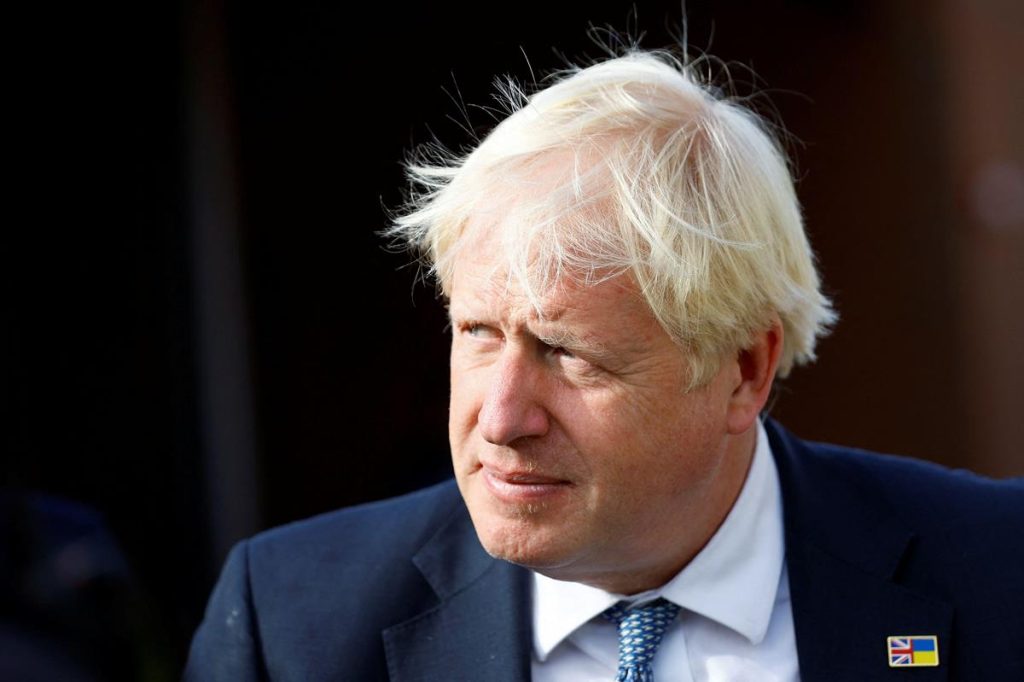
As Boris Johnson departs Downing Street, many want to remember him as the Prime Minister who delivered on Brexit, Covid and the war in Ukraine. But, while he had some success on these “big ticket” items, his enduring legacy is more complicated and tainted by scandal.
Many were surprised when, at the 12th and final Conservative leadership hustings on Wednesday evening, it was late-backer Michael Gove who introduced Rishi Sunak.
That surprise was then compounded when the former cabinet minister chose to heap praise on outgoing Prime Minister Boris Johnson, despite having been fired as levelling up secretary by him a few months earlier.
“Let us never forget and let us make sure the country never forgets. He was the man who delivered Brexit. He was the man who delivered the fastest vaccine rollout in the world. He was a man who stood resolute with Volodymyr Zelensky and the brave people of Ukraine when others wobbled and shirked the struggle. So, on behalf of all of us, Boris, thank you for your service,” he told the captivated crowd at Wembley Arena.
Tory Remorse?
Speaking outside the final hustings this week, some Conservative members suggested that, based on these successes, many will view Johnson’s departure with regret in future.
“We’ll have seller’s remorse in the future won’t we… there’s lots of members who still love him. You heard the clap when [Gove] mentioned his name. People still love him. Ukraine, the vaccine, Brexit – the big ticket items he got right,” one attendee told PoliticsHome.
For others, the lasting impression of Johnson’s political career to date is of a great campaigner and, ultimately, election winner. As one Conservative member put it, the party has “never seen such a uniting figure” as the current Prime Minister, the man who managed to “bring down the Red Wall”.
Tim Bale, professor of politics at Queen Mary, University of London, said that Johnson will likely be remembered more as “a super salesman rather than a skilled CEO”, an attribute most apparent in his involvement with the Vote Leave campaign and the majority win at the 2019 general election. But he believes the credit Johnson gets for both can be overstated.
“No one would be foolish enough to say that the Tories didn’t benefit from Boris Johnson’s charisma, and his ability to appeal to parts of the electorate that other Conservatives found difficult to reach,” he said.
“But if you look at his popularity more generally, he actually, during the 2019 contest wasn’t as popular overall as Theresa May had been in 2017. That’s an important thing to bear in mind, that the point about Boris Johnson was that he appealed to the right people at the right time. And, the fact that he turned a lot of people off in the end.”
The X Factor
According to Tony Travers, professor in the department of government at the London School of Economics, it was Johnson’s celebrity factor that made him such a unique politician, and catapulted him from Mayor of London into Downing Street.
“Somebody once observed he’s the only British politician recognisable from behind, in addition to being universally referred to by his first name. Very, very, few politicians are lucky enough to have that happened to them,” he said.
“Wherever he went people were trying to get selfies with him. He has that degree of style, a star quality, which meant people I felt emotionally about him.
“One of the reasons that partygate and the fall from grace proved so damaging is that the very emotional ties, the positive emotional reaction to him that many people have felt was suddenly replaced by a negative emotional reaction.”
Though many Conservative members still revere the Prime Minister, Bale believes that his record on delivering Brexit is likely to be “divisive and even poisonous”. He also questions the extent to which Brexit was actually “done” under his premiership.
“Johnson was very good at selling the idea that Brexit was an event. But of course, in reality, Brexit is a process. So, it was never going to be done and dusted in a way that he suggested. No politician can actually deliver it and then move on.”
Wither Levelling Up?
Another area of unfinished business for Johnson is his vision for levelling up, a flagship policy at the 2019 general election. Tim Durrant, associate director at the Institute for Government, said that the phrase had become “embedded” in the political zeitgeist. But, he argues that, much like Brexit, the mission is far from complete.
“It’s not new that this is a problem, that there are regional disparities across the country… But making such a focus is down for him. Whether or not something has actually happened as a result of that focus is still unclear.”
“I don’t think the concept has necessarily been fully proven, but the fact that this entered the political conversation, I think that’s his legacy.”
When it comes to his response to the coronavirus pandemic, the jury is largely still out. While the vaccine rollout was largely lauded a success, over 200,000 deaths in the UK have been linked to Covid, and there are enduring criticisms of the government’s decision making when it came to lockdowns and restrictions.
The ongoing public inquiry into the response to the crisis is due to begin preliminary hearings this autumn to unpack these criticisms, and Johnson’s responsibility for any successes or failings.
On his final “big ticket” achievement, the response to Russia’s invasion of Ukraine, the appraisal is much more positive. President Volodymyr Zelensky has praised Johnson’s “personal leadership and charisma” and thanked him for “helping more” than any other nation.
“He’s very much leaving as a cheerleader for Ukraine. That also, perhaps, allows him to cheer the benefits or opportunities or the strength of the UK outside the EU. Because we are, in a way he portrays at least, leading and doing things better than, or more than, other European countries,” Durrant said.
While Johnson would likely prefer to be remembered as the Prime Minister of Brexit, Covid and Ukraine, in reality many see his legacy as a lot less positive.
Unfinished Business
Throughout his time in Downing Street, he has battled a myriad of scandals from Dominic Cummings’ trip to Barnard Castle, his defence of Owen Paterson, his handling of “partygate” and his response to allegations against Chris Pincher.
“There was this sense of one scandal being cleared and then another would break about some kind of misbehaviour or mistake by a minister or member of the government. And it never really stopped,” Durrant said.
This is a legacy, Bale suggests, that will likely haunt the next Prime Minister, and many more to come. He said the public perception of standards in public life has been “very badly compromised” under Johnson, and it was up to his successor to “pull us out of that nosedive”.
“He’s behaved in a way that, I think, on occasion has made people fear for the safeguards that we thought our Constitution had… He’s behaved in ways that no previous Prime Minister would have countenanced,” he said.
“The public cynicism about politics has grown so much that they won’t expect any better from whoever takes over. Or, that whoever takes over will actually restore some of the faith that we all need to have in a functioning liberal democracy. I’m not sure which way it will go to be honest.”
At Johnson’s final PMQs, Johnson referenced all the big successes of his premiership, from Brexit and the 2019 election, to Ukraine and the pandemic response. He also steered clear of overtly referencing the many scandals that had prompted his premature departure.
But, in his final remarks, he also hinted at the unfinished nature of his big ideas and the vision that he had for the country. Some read his final words as a suggestion that this vision, and perhaps his political career, were far from complete.
He told MPs: “I’ve helped to get this country through a pandemic and help save another country from barbarism and, frankly, that’s enough to be going on with. Mission largely accomplished, for now.”
Eleanor Langford is a columnist with PoliticsHome.com where she first published this article on Saturday 3 September 2022.